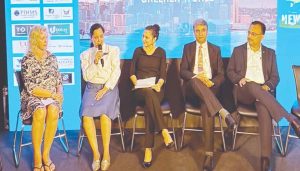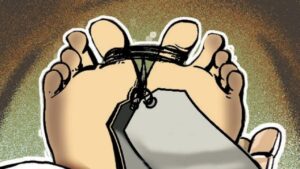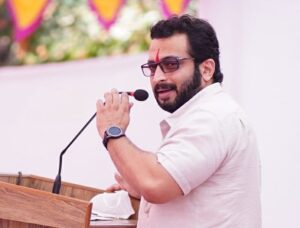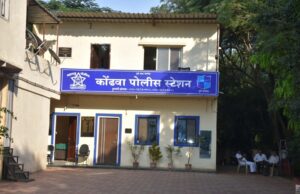Making education more relevant and contemporary: Infusing 21st Century Life Skills
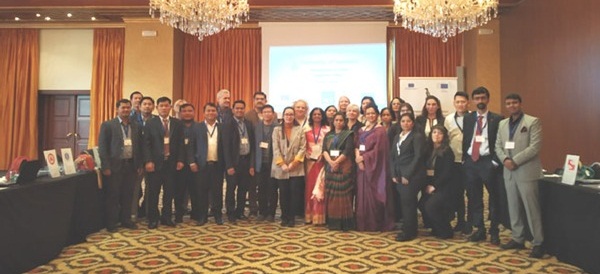
Pune, 24th November 2021: The significance of education for human development as mentioned in the United Nations Sustainable Development Goal 4, viz. “Ensure inclusive and equitable quality education and promote lifelong learning opportunities for all” is crucial. This is also in line with the National Education Policy 2020 which once fully implemented, envisages education to be Student and Skills Centric. It emphasises on critical thinking and problem solving in a creative and multidisciplinary environment.
Further with the growth of Artificial Intelligence which will enhance lives and disrupt various sectors including education, a new kind of intelligence known as “Digital Intelligence Quotient” is essential. As mentioned in the DQ Global Standards Report 2019, It is a comprehensive set of digital competencies rooted in universal moral values for individuals to use, control, and create technology to advance humanity. DQ aims to address the needs of educational systems, industries, and governments by providing a shared global blueprint to harness technology for a shared prosperous future during this 4th Industrial Revolution and far beyond.
What is 21st Teach Skills
It is in this context and in the backdrop of the New Education Policy 2020, recently, the CBSE Handbook on 21st Century Skills, 2020 mentioned that 21st Century Skills are the skills that are required to enable an individual to face the challenges of the 21st century world that is globally-active, digitally transforming, collaboratively moving forward, creatively progressing, seeking competent human-resource and quick in adopting changes.
Symbiosis International (Deemed University) (SIU) has been at the forefront of internationalization of higher education in India. Its robust internationalization has led to multifarious collaborations and projects with various prestigious international organizations and universities. Symbiosis Law School, Pune, a constituent of SIU which has been a torchbearer in this mission of internationalization with various projects, has recently been awarded Excellence in Internationalization of Education at the 7th FICCI Higher Education Excellence Awards 2021. It is also a recipient of various recognitions and funding including the prestigious Jean Monnet Chair Professor in EU Climate Justice Law, Governance, Management and Policy which was awarded to Dr. Shashikala Gurpur, Director, Symbiosis Law School, Pune.
About the Project
One such unique project is the Erasmus+ CBHE Project “Teacher training with specialization on life and information technology skills” (21st TS) which aims at strengthening the existing education system of the country by training teachers to equip students with skills and making them ready for jobs in the 21st Century. This project, which is monitored by the Symbiosis Centre for European Studies (SCES) was won by SIU by a competitive grant, is co-funded by the Erasmus+ Programme of the European Union and will run for a period of 3 years (2020-2024 with extension granted due to the Pandemic). This project will promote the objectives of the National Education Policy 2020 by making quality education more inclusive, equitable and ready for the 21st Century.
Project Consortium
The project coordinator is the University of Ioannina, Greece and Dr. Katerina Plakitsi, is the Project Manager. Dr. Palkitsi who is Professor of Science Education at the University of Ioannina and Head of the Early Childhood Department is an authority in the field of education and the principal investigator of the formal and informal science education group.
The other partners of this project are Symbiosis International (Deemed University) India; Banasthali Vidyapith, India; Klaipeda University (KU), Lithuania; Novel Group Sarl (Novel Group) Luxembourg; Southwest university, China; Shenzhen Polytechnic, China; Royal University of Phnom Penh, Cambodia and University of Battabang, Cambodia.

Objective and Impact
The project objectives:
● Improve the quality of higher education and life-long learning
● Enhance the relevance of education for the labour market
● Improve the level of competencies and skills in the Higher Education Institutes (HEIs)
● Enhance the innovation capacities as well as the internationalization of HEIs
● Promote voluntary convergence with EU developments of curriculum development in the field of education studies in higher education system
● Promote people-to-people contacts, intercultural awareness and understanding
These skills will be imparted to in-service and pre-service teachers in India and other Asian Countries. The project aims to target students, teachers, academicians, policy makers and eventually impact around 100000 stakeholders across Asia and 50000 in India.
Activity-I: Need and Gap Analysis
In 2019, an intense feasibility survey of teachers, students, academics across Maharashtra (Pune and Sangli) was conducted to identify relevant 21st century skills that are taught across different educational boards like Maharashtra Board, CBSE, ISCE, IB and IGCSE; in english medium as well as vernacular schools.
● Questionnaires responses received from the State of Maharashtra (Pune and Sangli): Teachers:125
Students: 284
Academics: 15
● State of Karnataka: Informal Survey through a network of 200 Schools
● This captured the diversity of the regulating body of the school, medium of instruction, remoteness, class and pedagogy etc.
Findings:
● The survey identified that the practice of imparting skills in general and 21st century skills, is not structured and systematic, except in the case of Information Technology skills and collaboration.
● Only 10% of the schools surveyed (other schools and IB Schools) have tinkering labs, Gifted Education and Research Centres
● Student Centric incremental learning of Critical Thinking and Collaborative Problem Solving Skills with structured course and measurement is lacking and exists in a piecemeal approach in some schools
Conclusion/Observations/Need for reform
Thus, there is a need for undertaking reforms in curriculum, mode of assessment, the method of imparting instructions and training the teachers to enable teachers to impart 21st century skills such as critical thinking skills, creativity, collaboration, global awareness, lateral thinking, self-initiative, self-direction, adaptability etc. in a structured and meaningful way. Additionally, policy guidelines were silent on these skills until the adoption of the New Education Policy 2020.
Activity-II: Kick-Off Meeting
A Kick-Off meeting was organized at the Coordinating University, University of Ioannina, Greece in February 2020 wherein key members of the Project from Symbiosis Law School, Pune who is executing this project Dr. Shashikala Gurpur, Director, Symbiosis Law School, Dean Faculty of Law SIU; Prof. Dr. Bindu Ronald, Prof. Dr. Aparajita Mohanty, Prof. Raj Anjanikumar Varma and Prof. Ujwal Nandekar underwent extensive training on developing curriculum that caters to the 21st Century Skills.

Activity-III: Curriculum building
From May 2020 till October 2021, under the project, 4 modules have been developed on the following subjects:
– Critical thinking and collaborative problem-solving skills
– Education Technology skills (based on the Technological Pedagogical Content Knowledge,
– Authentic learning tasks: practical implementation of the skills in the classroom
– Optimizing Assessment for 21st century skills.
These modules will be ultimately taught as courses to pre-service and in-service teachers in all the Asian Universities and will also be incorporated across all levels in the curriculum and as a MOOC course.
The Quality framework for each of these modules will be monitored by the Education Department of Banasthali Vidyapith, India.
The Module on Critical thinking and Collaborative problem-solving skills has been developed by Symbiosis International (Deemed University). Lengthy deliberations and workshops involving experts like Dr. K. P Mohanan, Co-Founder ThinQ who is an expert in Linguistic Theory, Critical Thinking; Dr. M. Madan Mohan, Vice Principal Symbiosis International School and an expert in Approaches to Learning and Digital Quotient; Dr. V. N. Jha Former Director of the Centre of Advanced Study in Sanskrit, Savitribai Phule Pune University, Pune; Mrs. Kamini Saxena, an educational expert and Principal, Kalmadi Shamrao High School and Management Facilitator, Kaveri Group of Institutes; Dr. Sophia Giakwad, Head STLRC Symbiosis International (Deemed University) among others.
A unique feature of the Critical thinking and Collaborative problem-solving skills module is the inclusion of units based on traditional Indian philosophy and schools of thought like Mimansa, Nyaya, Mindfulness of Buddha, among others. It further contains units on Metacognitive Skills, Empathy, employability skills such as Digital Quotient, Cross Cultural Competencies, human resources, psychology etc.
Activity-IV: 21st TS Lab
From October 2020, as a part of further deliverables for project execution and to ensure its outreach to the pre-service and in-service teachers especially in Pune, Maharashtra; Symbiosis Law School Pune has developed a one of its kind in the country “21st Century Teach Skills Lab” which is a part of the “EU Learning Resource Centre” established at Symbiosis Law School, Pune.
The project funding has catered to purchase of equipment such as: Smartboards, Classroom Response System, 3Doodlers Pro, Course Management Tools, Learning Management System, Tablets, Latest Computers, Video Conference System and Video Projector which are now a part of the EU Learning Resource Centre. The equipments will be used in the training the trainer programmes in both online and direct mode.
Way forward
Integration of 21st TS into Core Courses (November 2021 onwards)
This course has already been rolled out as a Value Added Course at Symbiosis Law School Pune and has been included as sub-units in compulsory courses pertaining to research skills (a. Legal Database, ICT and 21st Century Skills b.Legal Research Writing) across all programmes. This will eventually be expanded to all faculties of SIU.
Although the project activities were slowed by COVID 19, the visit of all project partners to diverse schools in Pune is expected to be conducted soon which will result in capacity building, training of teachers and the rolling out of the MOOC Course. Meanwhile the bilateral collaboration has been evolving with Dr. Katerina Plakitsi, Project Manager addressing an online audience of over 800 students, academics, policy makers on the Pedagogy in the 21st Century: Primer For Teaching and Research in the Virtual 9th International Annual Research Conference on Rule of Law in Context: Indian and Global Challenges organized by Symbiosis Law School, Pune in March 2021.
To ensure that the benefits of this project reach the maximum number of people, the project coordinator, University of Ioannina, Greece is organizing an event Infoday which will be held online and streamed on YouTube.
Dr. Mohanan who is a Ph.D. from MIT, USA has said that “Inquiry-Oriented Education, which seeks to develop the capacity for rational inquiry, has to be recognised as an important strand of education”. He also said that “If schools around the world could engage in discussions pursuing rational inquiry into principles and concepts of ethics, there would perhaps be far less violence in the world”.
While developing the module, Dr. Sophia Gaikwad said “The 21 st Century dawned with transformational changes in not only various sectors of the society but even in the belief systems, values and outlook of the very human existence. And hence equipping the present and coming generation/s to imbibe the 21st century teaching learning skills is imperative. These skills are going to help learners to make better and sustainable choices, be more resourceful and agile, and be more human.”
Abhishek Jain a student from the IB system which incorporates many 21st Century Skills said “The immediate change I noticed as a student when skills such as critical thinking are implemented in the classroom is that there is a build up of curiosity which means there is conceptual learning rather than mug up. This also allowed me to apply what I learnt in real life scenarios which is what education is all about.”

